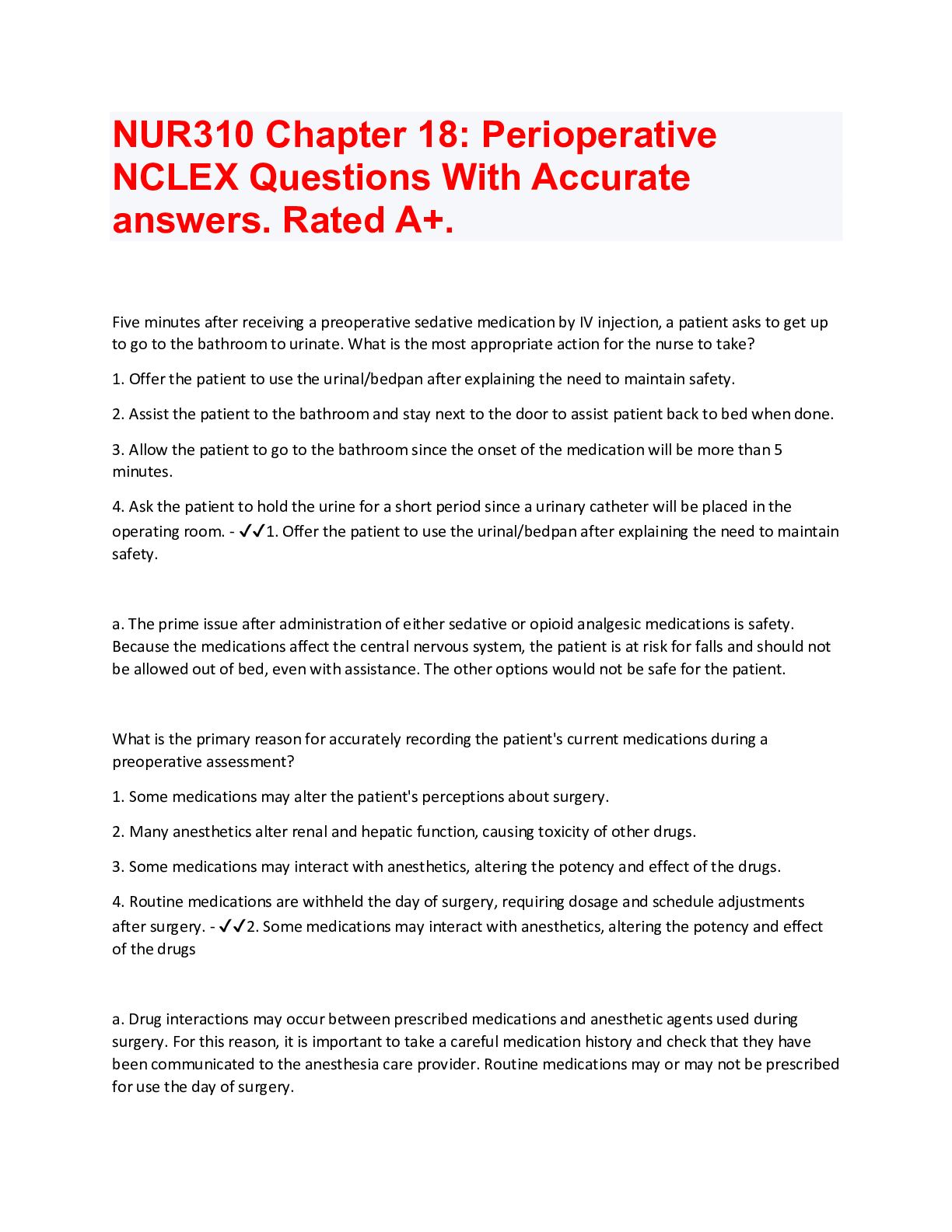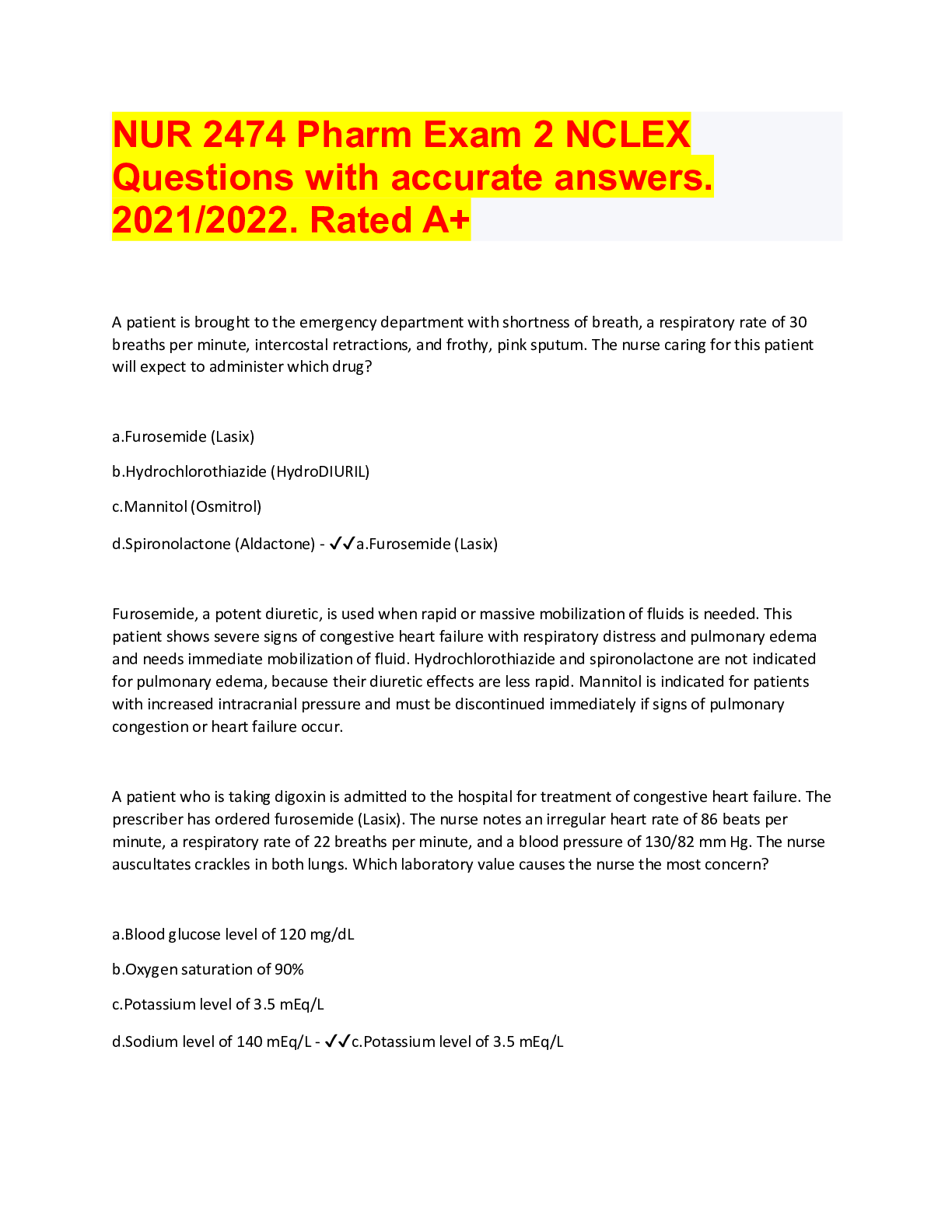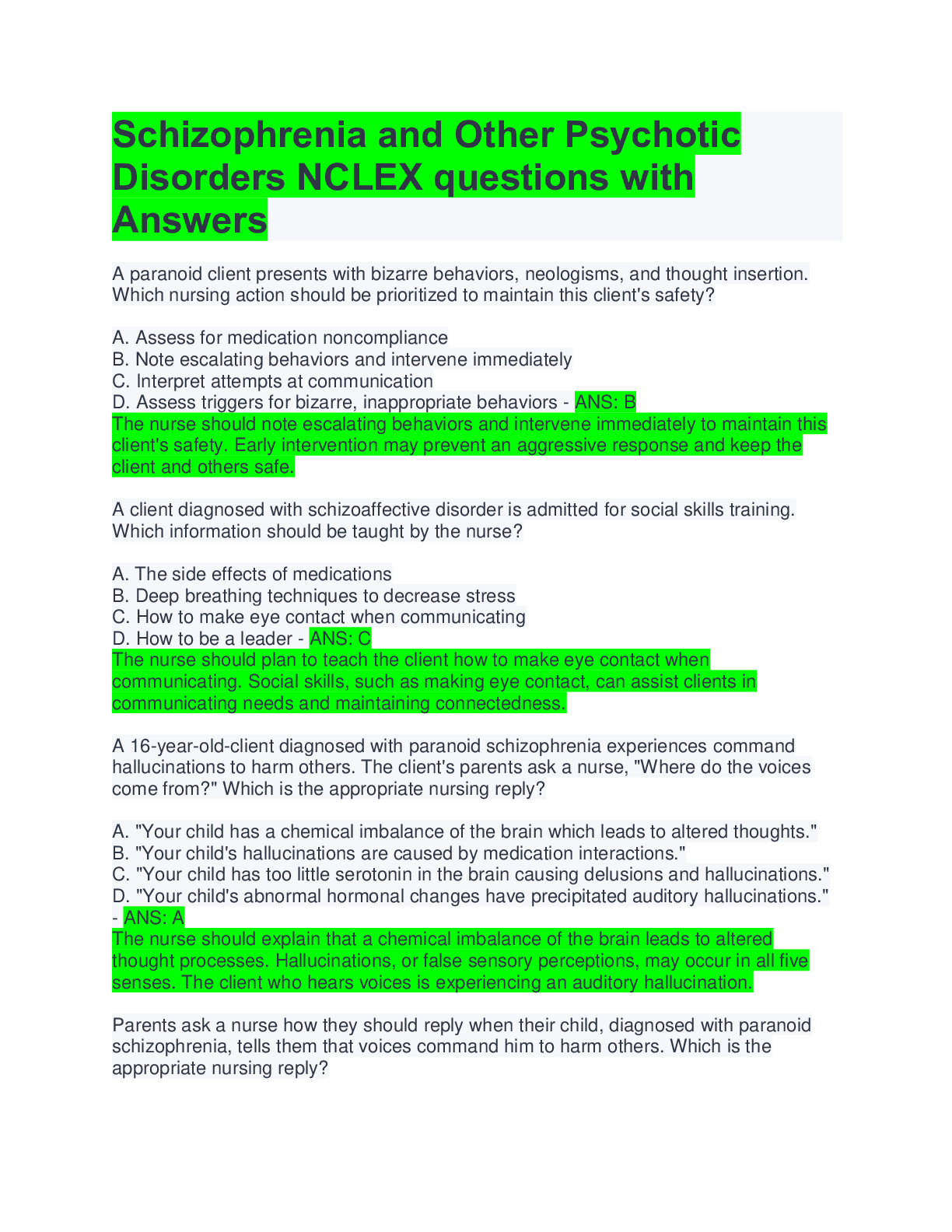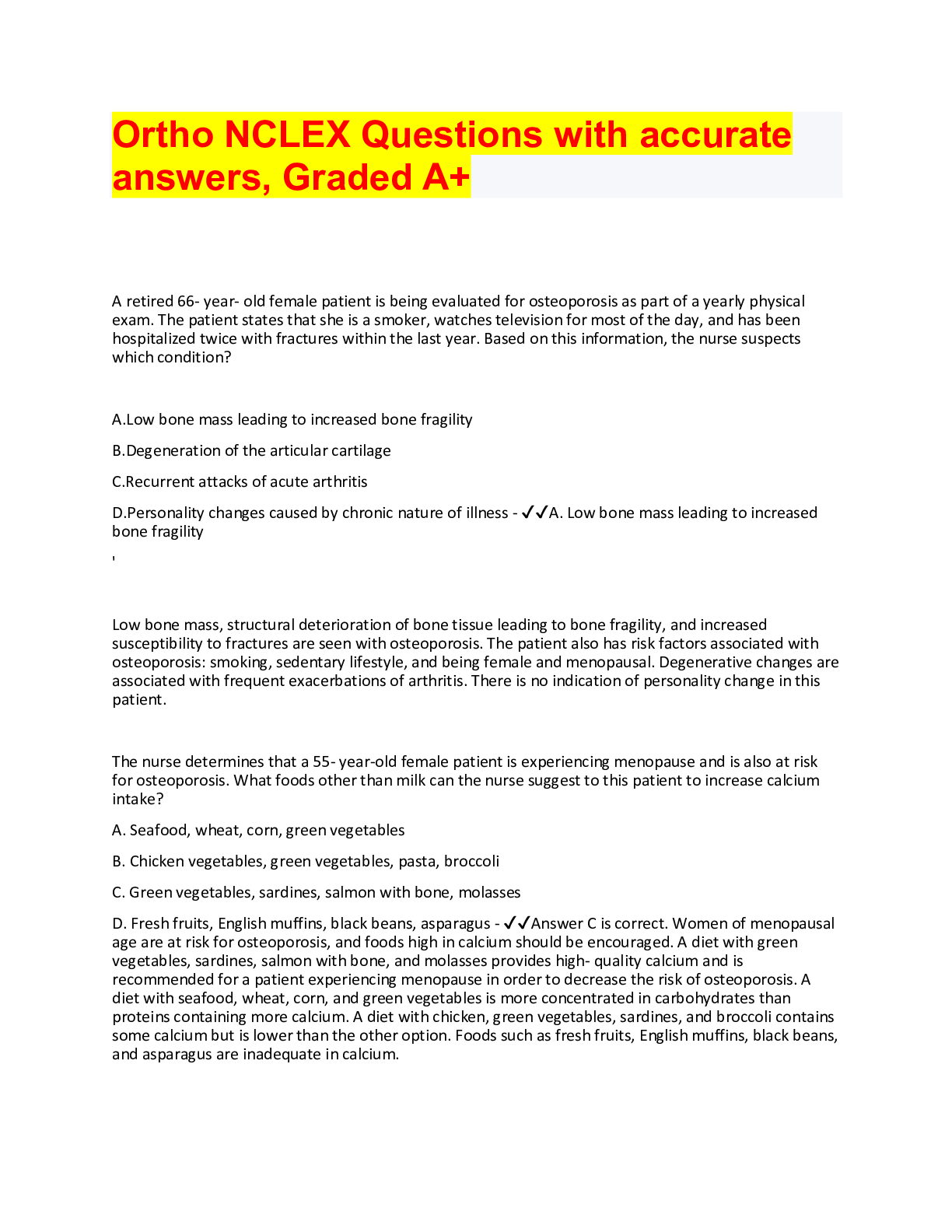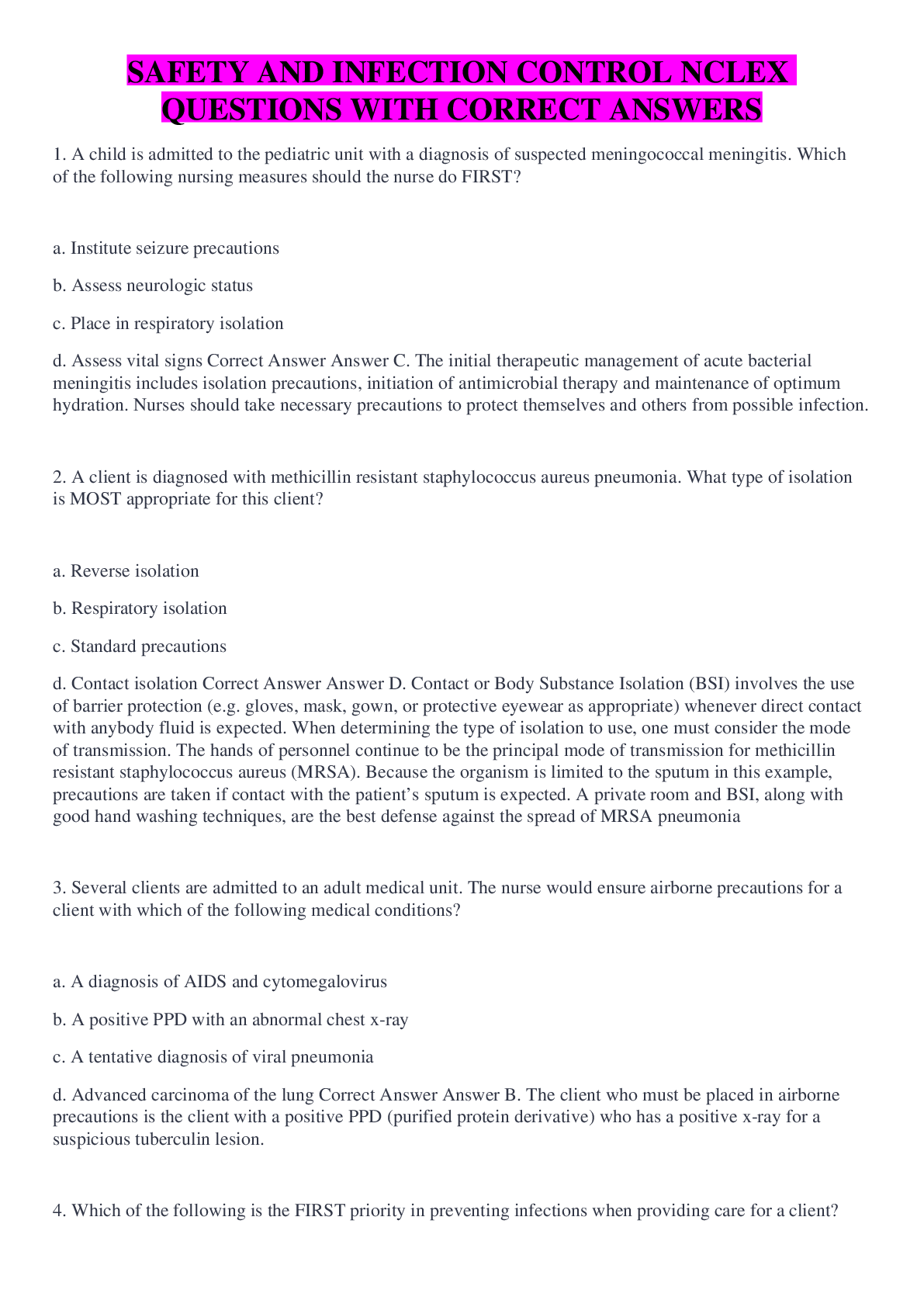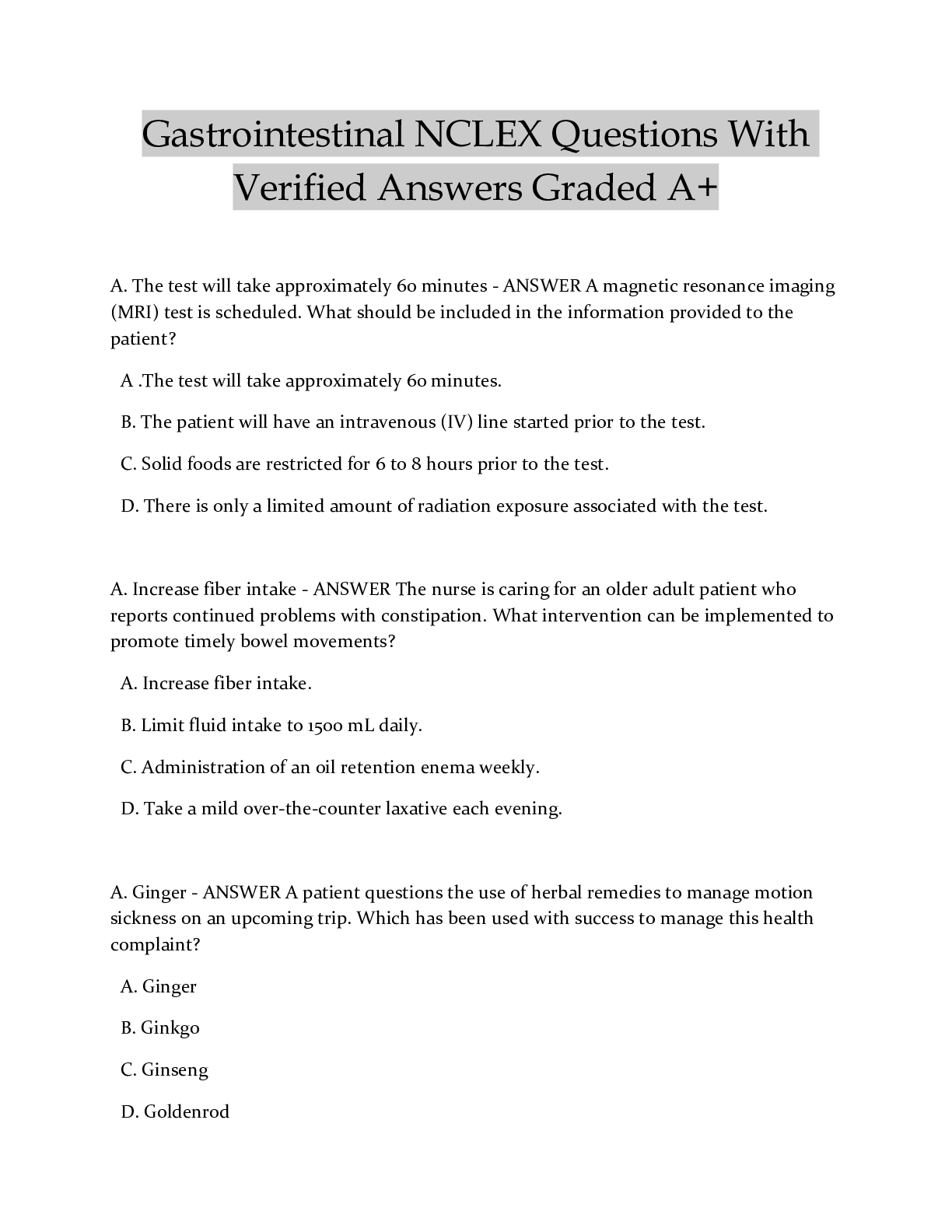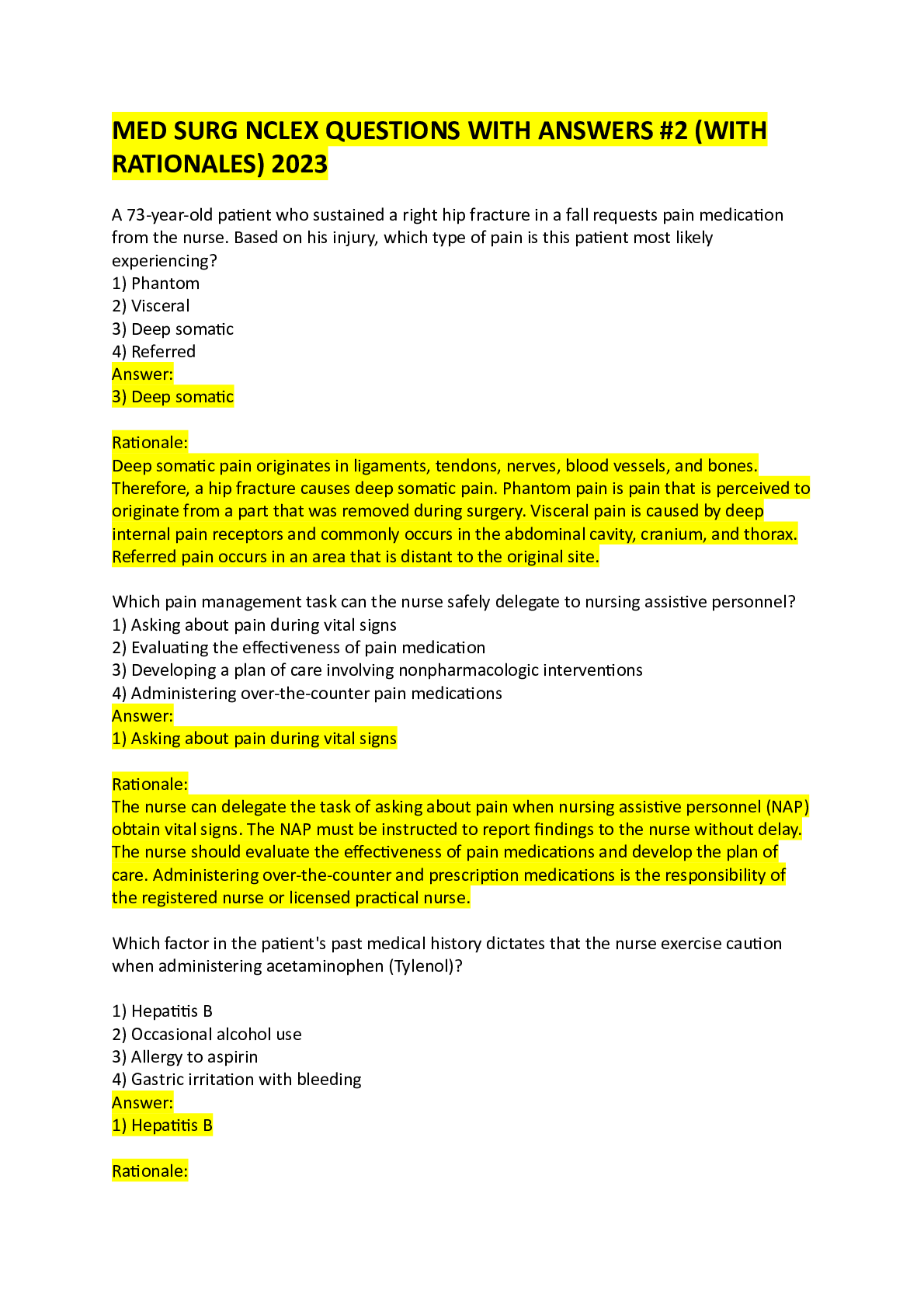*NURSING > QUESTIONS & ANSWERS > Mental Health NCLEX Questions with Answers,100% C0RRECT (All)
Mental Health NCLEX Questions with Answers,100% C0RRECT
Document Content and Description Below
Question: The home care nurse is visiting an older client whose spouse died 6 months ago. Which behavior by the client indicates ineffective coping? Question: A client with a diagnosis of major depre... ssion who has attempted suicide says to the nurse, “I should have died. I’ve always been a failure. Nothing ever goes right for me.” Which response demonstrates therapeutic communication? Question: When the mental health nurse visits a client at home, the client states, “I haven’t slept at all the last couple of nights.” Which response by the nurse illustrates a therapeutic communication response to this client? Question: A client experiencing disturbed thought … Which communication technique should the nurse use to encourage the client to eat? Question: A client admitted to a mental health unit for treatment of psychotic behavior spends hours at the locked exit door shouting, “Let me out. There’s nothing wrong with me. I don’t belong here.” What defense mechanism is the client implementing? Question: A client … with terminal cancer says to the nurse, “I’m going to die, and I wish my family would stop hoping for a cure! I get so angry when they carry on like this. After all, I’m the one who’s dying.” Which response by the nurse is therapeutic? Question: On review of the client’s record, the nurse notes that the mental health admission was voluntary. Based on this information, the nurse anticipates which client behavior? Question: When reviewing the admission assessment, the nurse notes that a client was … to the mental health unit involuntarily. Based on this type of admission, the nurse should provide which intervention for this client? Question: The nurse is preparing a client for the termination phase of the nurse-client relationship. The nurse prepares to implement which nursing task that is most appropriate for this phase? Question: The nurse in the mental health unit recognizes which as being therapeutic communication techniques? Select all that apply. Question: A client being seen in the emergency department immediately after being sexually assaulted appears calm and controlled. The nurse analyzes this behavior as indicating which defense mechanism? Question: A client’s unresolved feelings related to loss would … most likely observed during which phase of the therapeutic nurse-client relationship? Question: The nurse is working with a client who … making a heroic effort was unable to rescue a neighbor trapped in a house fire. Which client-focused action should the nurse engage in during the working phase of the nurse-client relationship? Question: The nurse employed in a mental health unit of a hospital is the leader of a group psychotherapy session. What is the nurse’s role during the termination stage of group development? Question: Which are characteristics of the termination stage of group development? Select all that apply. Question: When a client is admitted to an inpatient mental health unit with the diagnosis of anorexia nervosa, a cognitive behavioral approach is used as part of the treatment plan. The nurse understands that which is the purpose of this approach? Question: The nurse understands that which best describes Gestalt therapy? Question: A client is preparing to attend a Gamblers Anonymous meeting for the first time. The nurse should tell the client that which is the first step in this 12-step program? Question: Which describes the primary focus of milieu therapy? Question: While being treated, a client is introduced to short periods of exposure to the phobic object while in a relaxed state. What term is used to describe this form of behavior modification? Question: A client is planning to attend Overeaters Anonymous. Which statement by the client indicates a need for additional information regarding this self-help group? Question: What is the most appropriate nursing action to help manage a manic client who is monopolizing a group therapy session? Question: Which type of therapeutic approach has the characteristic that all team members are seen as equally important in helping clients meet their goals? Question: A client says to the nurse, “The federal guards were sent to kill me.” What is the best nursing response to the client’s concern? Question: A client diagnosed with delirium becomes disoriented and confused at night. Which intervention should the nurse implement initially? Question: A client is admitted to the mental health unit with a diagnosis of depression. The nurse should develop a plan of care for the client that includes which intervention? Question: When planning the discharge of a client with chronic anxiety, the nurse directs the goals at promoting a safe environment at home. Which is the most appropriate maintenance goal? Question: A client is unwilling to go out of the house for fear of “making a fool of myself in public.” Because of this fear, the client remains home bound. Based on these data, which mental health disorder is the client experiencing? Question: The nurse is conducting a group therapy session. During the session, a client diagnosed with mania consistently disrupts the group’s interactions. Which intervention should the nurse initially implement? Question: A client is admitted to a medical nursing unit with a diagnosis of acute blindness after being involved in a hit-and-run accident. When diagnostic testing cannot identify any organic reason why this client cannot see, a mental health consult is prescribed. Which condition will … the focus of this consult? Question: A manic client begins to make sexual advance towards visitors in the dayroom. When the nurse firmly states that this is inappropriate and will not … allowed, the client becomes verbally abusive and threatens physical violence to the nurse. Based on the analysis of this situation, which intervention should the nurse implement? Question: Which nursing interventions are appropriate for a … client with mania who is exhibiting manipulative behavior? Select all that apply. Question: The nurse observes that a client is pacing, agitated, and presenting aggressive gestures. The client’s speech pattern is rapid, and affect is belligerent. Based on these observations, what is the nurse’s immediate priority of care? Question: The nurse is preparing a client with a history of command hallucinations for discharge by providing instructions on interventions for managing hallucinations and anxiety. Which statement in response to these instructions suggests to the nurse that the client understands the instructions? Question: The nurse is caring for a client … with catatonic stupor who is lying on the bed in a fetal position. What is the most appropriate nursing intervention? Question: The nurse is caring for a client who is experiencing disturbed thought processes as a result of paranoia. In formulating nursing interventions with the members of the health care team, what best instruction should the nurse provide to the staff? Question: The nurse is planning activities for a client… with bipolar disorder with aggressive social behavior. Which activity would … most appropriate for this client? Question: The home health nurse visits a client at home and determines that the client is dependent on drugs. During the assessment, which action should the nurse take to plan appropriate nursing care? Question: Which interventions are most appropriate for caring for a client in alcohol withdrawal? Select all that apply. Question: The nurse determines that the wife of an alcoholic client is benefiting from attending an Al-Anon group if the nurse hears the wife make which statement? Question: A … client with a history of alcohol abuse tells the nurse, “I am leaving now. I have to go. I don’t want any more treatment. I have things that I have to do right away.” The client has not been discharged and is scheduled for an important diagnostic test to … performed in 1 hour. After the nurse discusses the client’s concerns with the client, the client dresses and begins to walk out of the hospital room. What action should the nurse take? Question: The nurse is preparing to perform an admission assessment on a client with a diagnosis of bulimia nervosa. Which assessment findings does the nurse expect to note? Select all that apply. Question: The nurse is caring for a female client who was admitted to the mental health unit recently for anorexia nervosa. The nurse enters the client’s room and notes that the client is engaged in rigorous push-ups. Which nursing action is most appropriate? Question: A client with a diagnosis of anorexia nervosa, who is in a state of starvation, is in a two-bed room. A newly admitted client will … assigned to this client’s room. Which client would … the best choice as a roommate for the client with anorexia nervosa? Question: The nurse is monitoring a hospitalized client who abuses alcohol. Which findings should alert the nurse to the potential for alcohol withdrawal delirium? Question: The spouse of a client admitted to the mental health unit for alcohol withdrawal says to the nurse, “I should get out of this bad situation.” What is the most helpful response by the nurse? Question: A client with anorexia nervosa is a member of a predischarge support group. The client verbalizes that she would like to buy some new clothes, but her finances are limited. Group members have brought some used clothes to the client to replace the client’s old clothes. The client believes that the new clothes were much too tight and has reduced her calorie intake to 800 calories daily. How should the nurse evaluate this behavior? Question: The nurse in the emergency department is caring for a young female victim of sexual assault. The client’s physical assessment is complete, and physical evidence has been collected. The nurse notes that the client is withdrawn, confused, and at times physically immobile. How should the nurse interpret these behaviors? Question: The nurse is reviewing the assessment data of a client admitted to the mental health unit. The nurse notes that the admission nurse documented that the client is experiencing anxiety as a result of a situational crisis. The nurse determines that this type of crisis could … caused by which event? Question: The nurse is conducting an initial assessment on a client in crisis. When assessing the client’s perception of the precipitating event that led to the crisis, what is the most appropriate question? Question: The nurse is developing a plan of care for a client in a crisis state. When developing the plan, the nurse should consider which factor? Question: The nurse observes that a client with a potential for violence is agitated, pacing up and down the hallway, and is making aggressive and belligerent gestures at other clients. Which statement would … most appropriate to make to this client? Question: A depressed client on an inpatient unit says to the nurse, “My family would … better off without me.” What is the nurse’s best response? Question: The nurse has been observing a client closely who has been displaying aggressive behaviors. The nurse observes that the behavior displayed by the client is escalating. Which nursing intervention is least helpful to this client at this time? Question: Which behavior observed by the nurse indicates a suspicion that a depressed adolescent client may … suicidal? Question: The police arrive at the emergency department with a client who has lacerated both wrists. What is the initial nursing action? Question: A moderately depressed client who was … 2 days ago suddenly begins smiling and reporting that the crisis is over. The client says to the nurse, “I’m finally cured.” How should the nurse interpret this behavior as a cue to modify the treatment plan? Question: The nurse is planning care for a client being admitted to the nursing unit who attempted suicide. Which priority nursing intervention should the nurse include in the plan of care? Question: The emergency department nurse is caring for an adult client who is a victim of family violence. Which priority instruction should … included in the discharge instructions? Question: A female victim of a sexual assault is being seen in the crisis center. The client states that she still feels “as though the rape just happened yesterday,” even though it has been a few months since the incident. What is the most appropriate nursing response? Question: A client is admitted to the mental health unit after an attempted suicide by hanging. The nurse can best ensure client safety by which action? Question: A client is admitted with a recent history of severe anxiety following a home invasion and robbery. During the initial assessment interview, which statement by the client would indicate to the nurse the possible diagnosis of posttraumatic stress disorder? Select all that apply. Question: The emergency department nurse is caring for a client who has been identified as a victim of physical abuse. In planning care for the client, which is the priority nursing action? Question: The nurse assesses a client with the admitting diagnosis of bipolar affective disorder, mania. Which client symptoms require the nurse’s immediate action? Question: The nurse is performing an assessment on a client with dementia. Which data gathered during the assessment indicates a manifestation associated with dementia? Question: The nurse is caring for a client with anorexia nervosa. Which behavior is characteristic of this disorder and reflects anxiety management? Question: A depressed client verbalizes feelings of low self-esteem and self-worth typified by statements such as “I’m such a failure. I can’t do anything right.” How should the nurse plan on responding to the client’s statement? Question: A client with diabetes mellitus is told that amputation of the leg is necessary to sustain life. The client is very upset and tells the nurse, “This is all my health care provider’s fault. I have done everything I’ve been asked to do!” Which nursing interpretation is best for this situation? Question: A client experiencing a great deal of stress and anxiety is being taught to use self-control therapy. Which statement by the client indicates a need for further teaching about the therapy? Question: The nurse is caring for a client who is at risk for suicide. What is the priority nursing action for this client? Question: A client comes to the emergency department after an assault and is extremely agitated, trembling, and hyperventilating. What is the priority nursing action for this client? Question: The nurse is developing a plan of care for a client who was experiencing anxiety after the loss of a job. The client is now verbalizing concerns regarding the ability to meet role expectations and financial obligations. What is the priority problem for this client? Question: The nurse has developed a plan of care for a client … with anorexia nervosa. Which client problem would the nurse select as the priority in the plan of care? Question: Which statement made by an unlicensed assistive personnel (UAP) indicates to the registered nurse that the UAP understands the concepts related to suicide? Question: Which client is most at risk for committing suicide? Question: A nursing instructor teaches a group of nursing students about violence in the family. Which statement by a student indicates a need for further teaching? Question: A client is being prepared for electroconvulsive therapy (ECT). The nurse’s plan of care for the day before ECT includes ensuring that the client follows which guideline? Question: A nursing student is assisting with the care of a client with a chronic mental illness. The nurse informs the student that a behavior modification approach (operant conditioning) will … used in treatment for the client. Which statement by the student indicates a need for further information about the therapy? Question: The nurse is performing an admission assessment on a client at high risk for suicide. The nurse should prepare to ask the client which assessment question to elicit data related to this risk? Question: The nurse in the mental health unit is performing an assessment in a client who has a history of multiple somatic complaints involving several organ systems. Diagnostic studies revealed no organic pathology. The care plan developed for this client will reflect that the client is experiencing which disorder? Question: A mental health nurse in a psychiatric unit is meeting with a client who has a long history of acting out and violent behavior. The client also is known to have abused drugs on numerous occasions. During the session the client says to the nurse, “I’m feeling much better now, and I’m ready to go straight.” Which response by the nurse would … therapeutic? Question: A client with a diagnosis of depression has been meeting with the mental health nurse for therapy sessions for the past 6 weeks. During the session the client says to the nurse, “I lost my job this week, and I’m going to … evicted from my apartment if I can’t pay my bill. The only person that I have is my daughter, but I don’t want to burden her with my problems.” Which response by the nurse would be therapeutic? Question: During a therapy session with a client with paranoid disorder, the client says to the nurse, “You look so nice today. I love how you do your hair, and I love that perfume you’re wearing.” Which response by the nurse would … therapeutic? Question: The nurse in the mental health unit is assigned to care for a female client with a diagnosis of acute depression. In communicating with the client, which statement would … appropriate for the nurse to make? Question: The nurse is planning care for a client with bipolar disorder who is experiencing psychomotor agitation. Which activity should the nurse plan for this client? Question: The nurse is developing a plan of care for a client with depression whose food intake is poor. The nurse should include which interventions in the plan of care? Select all that apply. Question: The nurse is monitoring a client with a diagnosis of schizophrenia. The nurse notes that the client’s emotional responses to situations occurring throughout the day are incongruent with the tone of the situation. The nurse should document the findings using which description of the client’s behavioral response? Question: A mental health nurse notes that a client with schizophrenia is exhibiting an immobile facial expression and a blank look. Which should the nurse document in the client’s record? Question: The nurse is developing a plan of care for the client with a diagnosis of paranoia and should include which interventions in the plan of care? Select all that apply. Question: The nurse is preparing a client for electroconvulsive therapy (ECT), which is scheduled for the next morning. Which interventions would … included in the preprocedural plan? Select all that apply. Question: A … client is receiving clozapine (Clozaril) for the treatment of a schizophrenic disorder. The nurse determines that the client may … having an adverse reaction to the medication if abnormalities are noted on which laboratory study? Question: A client has been prescribed disulfiram (Antabuse). Before giving the client the first dose of this medication, what should the psychiatric home health nurse determine? Question: A home care nurse making an initial home visit notes that a client is taking donepezil hydrochloride (Aricept). The nurse questions the client’s spouse about a history of which disorder that is treated with this medication? Question: The nurse is caring for a client with a diagnosis of agoraphobia. When communicating with the client about the disorder, the nurse should expect the client to describe which behavior? Question: A client recently admitted to the hospital in the manic phase of bipolar disorder is dehydrated, unkempt, taking antipsychotic medications, and complaining of abdominal fullness and discomfort. The nurse determines that which intervention is most appropriate for these complaints? Question: A homebound client confidentially discusses suicidal plans with the visiting nurse. Based on professional duty to observe confidentiality, which statement bestdescribes the nurse’s obligation to the client? Question: The mental health nurse is reviewing the discharge plan for a … client. In reviewing the plan, the nurse recognizes that which is the most prominent problem in the management of a client with a mental health problem in the community? Question: During a home visit, the nurse suspects that a young daughter of the client is bulimic. The nurse bases this suspicion on which primary characteristic of bulimia? Question: The mental health nurse is talking to a client who has been diagnosed with posttraumatic stress disorder. During the conversation, the nurse notes that the client is exhibiting a paranoid stare and that he begins to pace and fidget. What is the appropriate nursing intervention? Question: The nurse is reviewing the record of a client admitted to the mental health unit. The nurse notes documentation that the client experiences flashbacks. What diagnosis should the nurse expect to … documented for this client? [Show More]
Last updated: 2 years ago
Preview 1 out of 1 pages

Buy this document to get the full access instantly
Instant Download Access after purchase
Buy NowInstant download
We Accept:

Reviews( 0 )
$40.00
Can't find what you want? Try our AI powered Search
Document information
Connected school, study & course
About the document
Uploaded On
Jul 09, 2020
Number of pages
1
Written in
Additional information
This document has been written for:
Uploaded
Jul 09, 2020
Downloads
0
Views
204



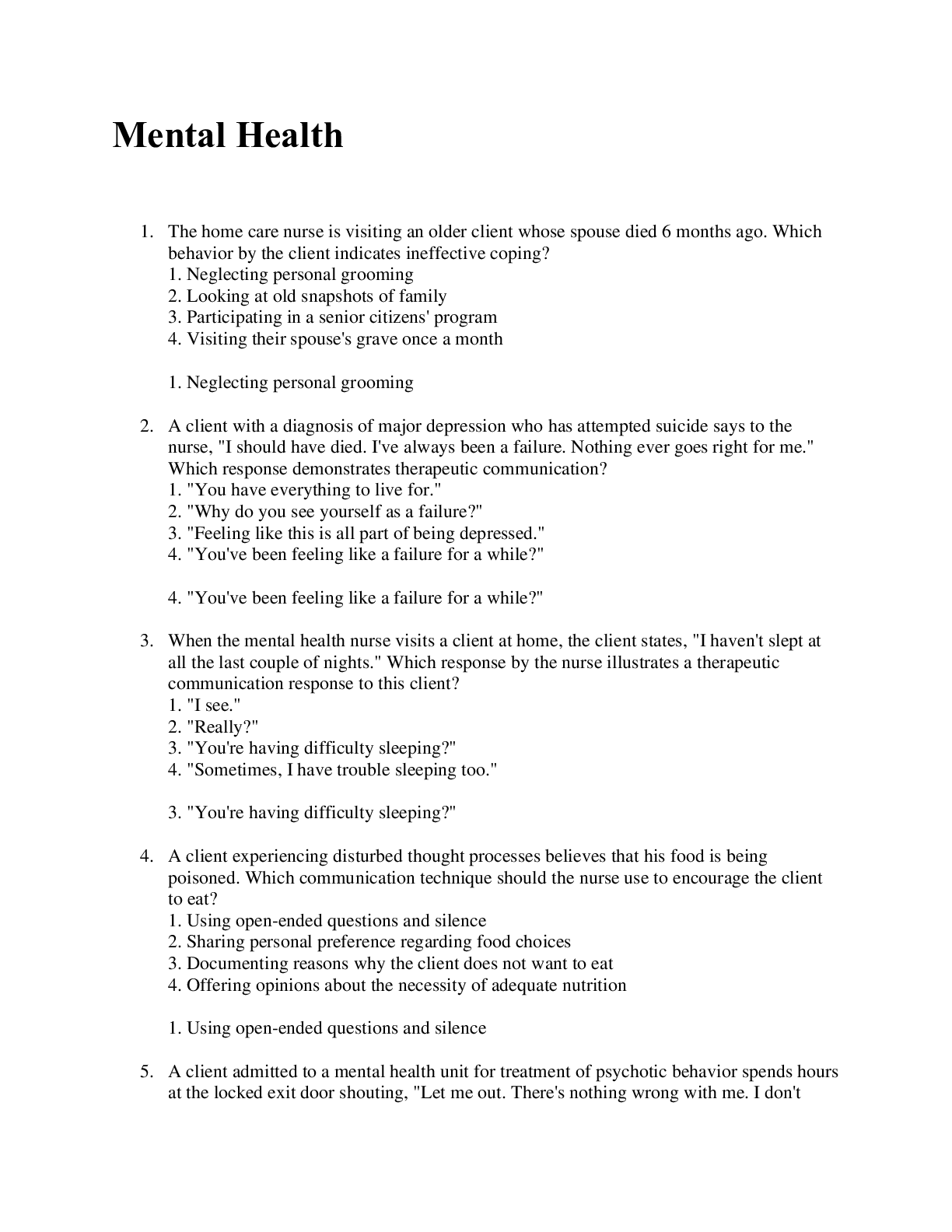
.png)
